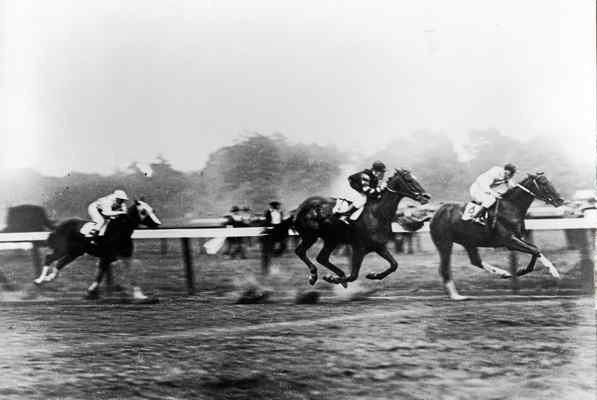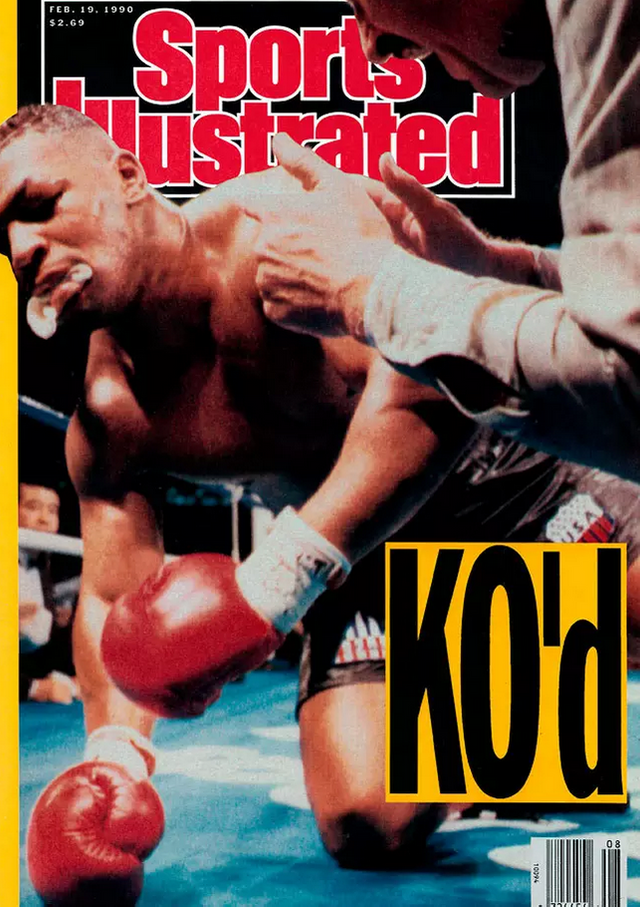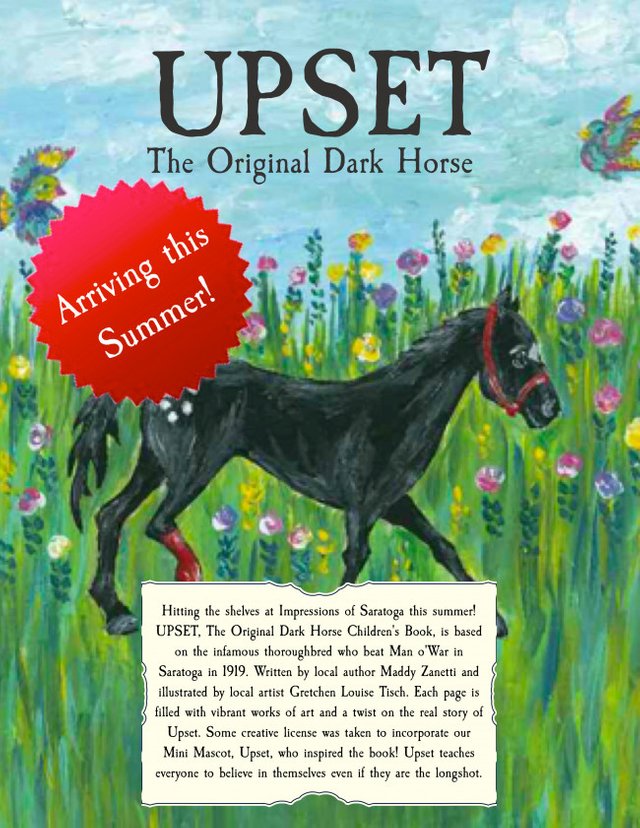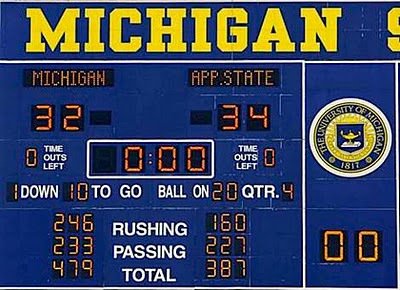The Sports ‘Upset’ Did Not Begin with Man o’ War

Look up the English word “upset” in a dictionary and you’ll find a few entries. Specifically, it mentions three forms of the word: verb, noun, and adjective. Within each, the word has various meanings that center around making someone unhappy or disappointed, causing disorder, or disrupting something.
Digging deeper, there are some other marginal uses of the word “upset.” But the most interesting variation pops up as a noun. An “upset” can mean an unexpected result or situation. This is most commonly used in sports. For example, when 42-1 underdog Buster Douglas knocked out boxing champion Mike Tyson, almost no one expected that result. So we could say, “It was an upset. Buster Douglas upset Mike Tyson.”

Douglas' defeat of Tyson qualified as an upset. Sports Illustrated.
Certainly, this meaning of the word “upset” is not a bad fit with the word’s other meanings. But it does represent an extension of the meaning. Sometime in the past, a person took the disruptive term and coined a slightly new expression in the sporting context.
When did that occur? Many people believe it began in 1919 when a heavily favored horse, Man-O-War, lost a race to an underdog horse named Upset. They could well be correct that this event created momentum for the term and made it more popular. But research has proven that the sports “upset” did not begin with Man o’ War. The term was in common usage well before then.

News of Upset's upset of Man o' War in 1919.
Man o’ War is considered to be one of the most successful racehorses in history. In 1920, he was named by the New York Times as the outstanding athlete of the year (co-winner along with Babe Ruth). Numerous publications ranked him as the top racehorse of the 20th century. Man o’ War’s career spanned 21 races, of which he won 20. His only loss came in the Sanford Memorial in August 1919 when he lost narrowly to a horse named Upset. There had been a mix-up at the start of the race (this was before they used starting gates for the horses, and the official in charge may have made a mistake). Man o’ War had started late and still gained enough to almost beat Upset. He did beat Upset in four other races.

Upset: The Original Dark Horse, a book by Mandy Zanetti. I am not suggesting the term was misused in this book, which I have not read. Certainly, Upset's win was a great underdog story.
Upset one this race. So this particular contest was probably an outlier. Nonetheless, the underdog appropriately named Upset certainly pulled one off there. Therefore, the myth has continued that Man o’ War’s only defeat spawned the use of the term “upset” in sports.
In her book Man o’ War, author Dorothy Ours seeks to debunk that myth: “Sports headlines predating the 1919 Sanford Memorial prove the term upset for an unexpected result did not originate with Upset beating Man o’ War. For example, ‘Days of Upsets at Belmont Park….’ New York Herald, Sept 7, 1918 and ‘Upsets at Jefferson Park,’ Daily Racing Form, March 16, 1919.”

Man o' War, a book by Dorothy Ours.
According to New York University librarian George A. Thompson, the New York Times reported way back in 1877 that a program at New Jersey's Monmouth Park racetrack "indicates a victory for the favorite in each of the four events, but racing is so uncertain that there may be a startling upset."
Writer Ben Zimmer also found the following early references (and these were only some examples, not all of them):
At the York August meeting, there were only four runners for the Chesterfield Handicap of 208 sovs., one mile, and the favorite, Ellermire, 5 yrs., 7st. 121b., was upset by the Dipthong colt, 3 yrs. 6st. 2lb. —Spirit of the Times, Sept. 5 1857, p. 355
Throughout the day the fielders had the best of it, as only two favorites won, while many which were heavily backed were upset. —Turf, Field, and Farm, Sept. 7, 1867, p. 146
In nearly every race the favorite was upset. —Turf, Field, and Farm, Aug. 7, 1868, p. 515
And so it seems clear that Upset’s 1919 upset of Man o’ War was not the first instance that the term was used. It made for a nice, convenient story about the word’s origin. And it may have served to popularize the term “upset” in sports. But the word was being used already at that point and had been for decades. It's certainly continued being important in the modern era.

The scoreboard in an upset game in which Division 2 Appalachian State beat the mighty University of Michigan. NBC Sports.
References:
https://www.amazon.com/Man-War-Legend-Like-Lightning/dp/0312341008
https://en.wikipedia.org/wiki/Man_o%27_War
https://latimesblogs.latimes.com/sports_blog/2011/05/sports-legend-revealed-did-the-term-upset-in-sports-derive-from-a-horse-named-upset-defeating-man-o-.html
https://www.visualthesaurus.com/cm/wordroutes/debunking-the-legend-of-upset/
http://colinsghost.org/2009/08/myth-about-upset-1919.html
Top image: The (in)famous race. Public domain.
Imagining man o war losing to upset world've been really upsetting for him in essence but what a career filled with laurels, he'll I heard so much of man o war
He won a lot of races for sure.
Ugh. You had to throw App state in there? I really hope you were just googling upsets and came across that and that you aren't actually an Ohio State or Michigan State fan.
Hey, it belongs on the all time upsets list!
Hello Friend how are you? as always it is a pleasure to greet you and always learn something new with you.
Annoyed or angry seem to be the same word for my annoying being upset is like it will happen very fast, it is not serious, but angry is much stronger.
now seeing these two words words in the deporte for my Angry and annoying is the same
This is interesting indeed. I haven't heard of this before. I would like to share a different kind of Upset in horse racing.
Horse racing track in our area sets up a celebration show every Fourth of July. They have pony rides for kids, fireworks, etc. A few years ago we went there on the fourth of July with friends and family.
We placed some wagers. Mainly losing ones. The last race we had a bigger amount placed on a horse (don't remember the name). Luckily for us, the horse came in first. We started celebrating. A few minutes later there was an announcement that race results were under review.
Apparently, jockeys can make an inquiry if there was some kind of violation by another jockey or a horse. The horse that won (our pick) was disqualified for a violation and placed at 4th place, which meant we lost again.
We were really UPSET. :)
That's an upsetting tale. :)
When I first saw 'man o war', my mind was shifted to a particular paramilitary in my country named after the phrase until I saw 'upset' which made it more complicated. But I got to understand the term reading the while content. Though, I never knew upset was being derived or stem from sport in the first instance but thanks to you, I got to know more.
There's also a jellyfish called a man o' war.
A great review @donkeypong and I didn’t even suspect that the term “upset” has several uses, for me personally, “upset” meant that someone was disheartened by the result that was not achieved, but you showed me in this message that can approach differently this term.
It's an extended meaning of that applied to sports, I think.
Learned something new today which is always a good thing, thanks!
I was a part of a few college footbal upsets, playing at WVU. Crying fans of the opposite team is beautiful.😂
Posted using Partiko Android
Make 'em cry!
You are right, sir ... upset and angry are an unpleasant situation. In sport If their team loses, the audience will be upset , angry. and disappointed. In my country the audience will fight until someone is injured and killed if their favorite soccer team loses. getting upset and angry can lead to crime. In war because angry soldiers will kill many civilians. Ops ... I really don't like the word "angry" and upset.
@donkeypong, Firstly thank you for sharing most educative looks blog post. Before published this content I never thought upset had more meanings. Yeah...upset combined with boxing game lot. But more states use it commonly.